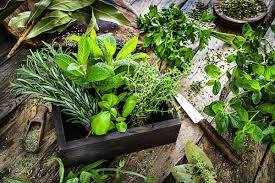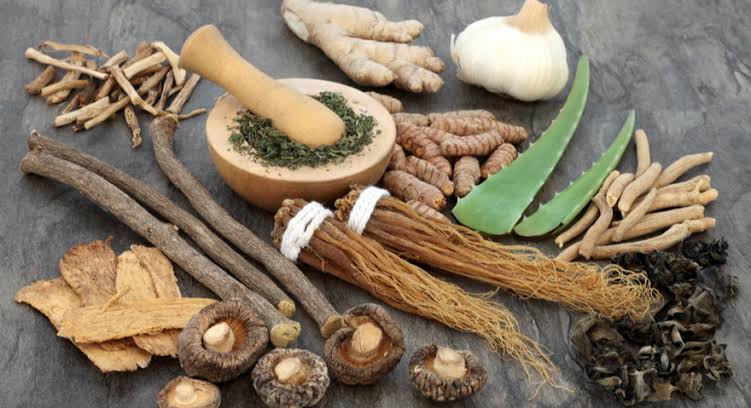Adaptogenic herbs are a special group of plants that can help your body adapt to various stressors and maintain balance. These remarkable herbs have been used for centuries in traditional medicine systems, such as Ayurveda and Traditional Chinese Medicine, to promote overall well-being and resilience.
Adaptogenic herbs are natural substances, primarily derived from plants, that possess unique properties. These herbs help the body respond to stressors, whether they are physical, emotional, or environmental, by promoting a state of equilibrium or homeostasis. In simpler terms, they help your body stay balanced and healthy, even when facing challenges.
How Do Adaptogenic Herbs Work? The magic of adaptogenic herbs lies in their ability to modulate the body’s stress response system, which includes the hypothalamus-pituitary-adrenal (HPA) axis. When you encounter stress, your body releases hormones like cortisol. Adaptogens help regulate the release of these stress hormones, preventing them from reaching excessive levels. This regulation keeps your body from overreacting to stress and minimizes the potential damage it can cause.
There is a diverse range of adaptogenic herbs, each with its unique set of properties and benefits. Some of the most well-known adaptogens include:
1. Ashwagandha: This herb, often referred to as “Indian ginseng,” is known for its ability to reduce stress, improve sleep, and boost overall vitality.
2. Rhodiola Rosea: Rhodiola is celebrated for its capacity to enhance mental and physical performance, reduce fatigue, and support mood stability.
3. Panax Ginseng: Ginseng is a popular adaptogen used to increase energy levels, enhance cognitive function, and strengthen the immune system.
4. Holy Basil (Tulsi): Holy basil is a revered herb in Ayurveda for its stress-relieving properties and its potential to improve respiratory health.
5. Maca Root: Maca is known to increase stamina, improve mood, and support hormonal balance, particularly in women.
Read Also: All You Need to Know About Wild Foxes
Benefits of Adaptogenic Herbs

Incorporating adaptogenic herbs into your daily routine can offer a wide array of benefits, including:
1. Stress Reduction: Adaptogens help your body cope with stress, reducing its negative impact on your health.
2. Enhanced Energy: Many adaptogens boost energy levels without the jitters or crashes associated with caffeine.
3. Improved Mental Clarity: Adaptogens can enhance cognitive function, helping you stay focused and alert.
4. Better Sleep: Some adaptogens, like ashwagandha, promote relaxation and improve sleep quality.
5. Balanced Hormones: These herbs can support hormonal balance, which is essential for overall well-being.
Adding adaptogenic herbs to your daily routine is easy. You can find them in various forms, including capsules, powders, teas, and tinctures.
Here are some simple ways to incorporate adaptogens into your life:
1. Morning Tea: Start your day with a cup of adaptogenic herbal tea to boost your energy and resilience.
2. Smoothies: Add a teaspoon of adaptogenic powder to your morning smoothie for an extra health kick.
3. Capsules or Tinctures: Take adaptogenic supplements daily, following the recommended dosage.
4. Culinary Delights: Some adaptogens, like maca, can be sprinkled on food for added flavor and benefits.
5. Relaxing Bedtime Tea: Enjoy a soothing adaptogenic tea before bedtime to promote relaxation and restful sleep.
In addition, adaptogenic herbs are nature’s gift to help us adapt to life’s challenges and maintain balance in a world filled with stressors. By incorporating these remarkable herbs into your daily routine, you can enhance your well-being, boost your resilience, and enjoy a happier, healthier life. Why not explore the world of adaptogens and experience the benefits for yourself?
Herbs for Inflammation

Inflammation is when your body becomes red, swollen, and painful because it’s trying to fight off something that’s hurting it. Herbs are like special helpers for your body. They can help calm down this inflammation and make you feel better.
One of the best herbs for inflammation is turmeric. Turmeric is like a golden treasure. It has a special thing inside called curcumin, which is really good at calming down the redness and swelling. People have been using turmeric for a long, long time to help with inflammation. You can use it in your food, like curry, or even in tea.
Ginger is another herb that’s good for inflammation. It’s like a spicy friend for your body. Ginger can help your body fight off the bad stuff that makes it hurt. You can put ginger in your food or make ginger tea. It’s tasty and helpful!
Holy basil is a herb that’s really good for calming down inflammation too. It’s like a peaceful herb that makes your body feel calm and happy. You can make tea with holy basil leaves, and it will make you feel better inside.
Rosemary is an herb that smells really nice, and it’s good for inflammation too. It’s like a fragrant friend that can help your body. You can use rosemary in your cooking, and it will not only taste good but also help your body feel better.
Chamomile is a gentle herb that’s great for soothing inflammation. It’s like a cozy blanket for your body. You can make chamomile tea and sip it slowly to help your body relax. Green tea is another good friend for your body when it’s inflamed. It’s like a sip of nature’s goodness. Green tea has something called antioxidants that can help your body heal and feel better.
Oregano is a flavorful herb that can help with inflammation too. It’s like a burst of flavor that’s also good for you. You can sprinkle oregano on your food to make it taste yummy and help your body at the same time.
These herbs are like nature’s helpers. They can make your body feel better when it’s hurting from inflammation. Remember, it’s always a good idea to talk to a grown-up or a doctor before using herbs, especially if you’re not feeling well. They can help you use the right herbs in the right way to make your body happy and healthy.
Read Also: Wild African Cat Description and Complete Care Guide
Antiviral Herbs

Viruses are tiny things that can make us sick. But nature has given us some amazing herbs that can help fight these viruses and keep us healthy. These herbs are like natural shields that protect our bodies.
Here are some antiviral herbs that are like superheroes for our health:
1. Echinacea: Echinacea is like a fortress for your immune system. It helps your body fight off viruses and infections. You can make tea with echinacea or find it in supplements.
2. Garlic: Garlic is like a superhero with a strong shield. It has compounds that can help your body battle viruses. Eating garlic in your food is a tasty way to stay healthy.
3. Ginger: Ginger is like a warm hug for your immune system. It can help your body fight off viruses and reduce inflammation. You can make ginger tea or add it to your meals.
4. Astragalus: Astragalus is like a protective cloak for your body. It boosts your immune system and can help prevent viral infections. You can find it in supplements or use it in herbal teas.
5. Licorice Root: Licorice root is like a soothing healer. It has antiviral properties and can ease a sore throat or cough. You can make licorice tea or find it in natural remedies.
6. Oregano Oil: Oregano oil is like a powerful weapon against viruses. It contains compounds that can fight off various infections, including viruses. You can use oregano oil as a supplement, but be sure to follow the directions carefully.
7. Lemon Balm: Lemon balm is like a calming friend for your body. It can help reduce stress, which is good for your immune system. You can make lemon balm tea and enjoy its soothing effects.
8. Elderberry: Elderberry is like a sweet defender. It’s rich in antioxidants and can help your body fight off cold and flu viruses. You can find elderberry syrup or supplements.
9. Cat’s Claw: Cat’s claw is like a jungle warrior. It has antiviral properties and can boost your immune system. You can find cat’s claw supplements in health stores.
10. Andrographis: Andrographis is like a secret agent against viruses. It can help reduce the severity and duration of viral infections. You can find it in herbal remedies.
These antiviral herbs are like nature’s gifts to help keep us healthy. Remember that while herbs can be beneficial, it’s essential to consult with a healthcare professional, especially if you have a medical condition or are taking medications. They can guide you on how to use these herbs safely and effectively to support your overall well-being.
Types of Herbs
Herbs come in a variety of types, each with its own unique flavors, aromas, and uses. Here are some common types of herbs:
1. Culinary Herbs: These herbs are used primarily for cooking to add flavor and aroma to dishes. Common culinary herbs include basil, oregano, thyme, rosemary, parsley, and cilantro.
2. Medicinal Herbs: These herbs are valued for their potential health benefits and are often used in herbal medicine. Examples include echinacea, ginseng, chamomile, and St. John’s wort.
3. Aromatic Herbs: These herbs are prized for their strong scents and are used in cooking, perfumes, and aromatherapy. Examples include lavender, mint, lemon verbena, and lemongrass.
4. Herbs for Tea: Some herbs are specifically grown for making herbal teas. Popular choices include chamomile tea, peppermint tea, hibiscus tea, and ginger tea.
5. Spices: While not technically herbs, spices are often grouped with them. Spices are derived from various parts of plants, such as seeds, bark, and roots, and are used to season food. Examples include cinnamon, cumin, coriander, and cardamom.
6. Native Herbs: These are herbs that are indigenous to specific regions or countries and are often used in traditional cuisines. Examples include bay leaves in Mediterranean cooking and epazote in Mexican cuisine.
7. Herbs for Fragrance: Some herbs are grown for their pleasant fragrances and are used in potpourri, sachets, or as natural air fresheners. Examples include lavender, rose petals, and sweet marjoram.
8. Ornamental Herbs: These herbs are primarily grown for their attractive foliage, flowers, or growth habits. They can be used to enhance the appearance of gardens and landscapes. Examples include variegated sage and purple basil.
9. Herbs for Companion Planting: Certain herbs are planted alongside vegetables or other plants to deter pests or enhance growth. For instance, basil is often planted near tomatoes to improve their flavor and deter insects.
10. Herbs for Medicinal Teas: Some herbs are specifically used to make soothing and healing herbal teas. Examples include valerian root for relaxation and marshmallow root for throat comfort.
11. Herbs for Skin Care: Herbs like aloe vera and calendula are used in skincare products for their soothing and healing properties.
12. Herbs for Insect Repellent: Herbs like citronella, mint, and lavender are known for their ability to repel insects and are often used in natural insect repellent products.
These are just some of the many types of herbs available, and they can be used in a wide range of applications, from culinary delights to natural remedies and beyond.

